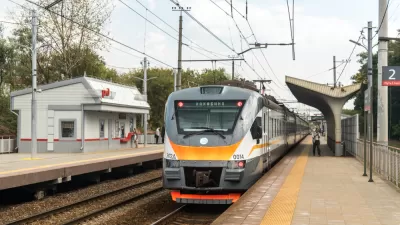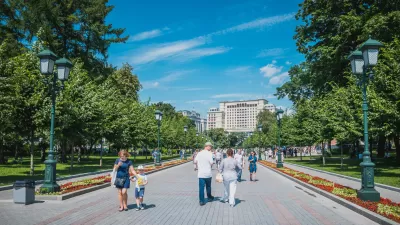Nate Berg reports on a plan by federal and city government officials in Moscow to decamp from the central city for offices in newly annexed outer regions, and to redevelop the former office buildings as housing and hotels.
Why would officials vacate the center of the 865-year-old city? According to mayor Sergei Sobyanin, it's a lack of parking.
In an odd bit of reasoning, Berg reports that officials cite the fact that, "many federal workers travel to work by car, but few apartment dwellers in the city have cars. Sobyanin thinks it simply makes sense to put more car-less people in a parking-deprived area and take those dependent on their cars to an area where more parking can be made available."
The move has been made possible by a recent annexation and expansion plan that will increase the size of Moscow by 2.3 times. To solve the notorious traffic problems in the city, officials envision turning Moscow from a unicentric city into a polycentric model with multiple job centers, reports Berg.
FULL STORY: Moscow Government Buildings to Be Converted to Housing

Maui's Vacation Rental Debate Turns Ugly
Verbal attacks, misinformation campaigns and fistfights plague a high-stakes debate to convert thousands of vacation rentals into long-term housing.

Planetizen Federal Action Tracker
A weekly monitor of how Trump’s orders and actions are impacting planners and planning in America.

San Francisco Suspends Traffic Calming Amidst Record Deaths
Citing “a challenging fiscal landscape,” the city will cease the program on the heels of 42 traffic deaths, including 24 pedestrians.

Bend, Oregon Zoning Reforms Prioritize Small-Scale Housing
The city altered its zoning code to allow multi-family housing and eliminated parking mandates citywide.

Amtrak Cutting Jobs, Funding to High-Speed Rail
The agency plans to cut 10 percent of its workforce and has confirmed it will not fund new high-speed rail projects.

LA Denies Basic Services to Unhoused Residents
The city has repeatedly failed to respond to requests for trash pickup at encampment sites, and eliminated a program that provided mobile showers and toilets.
Urban Design for Planners 1: Software Tools
This six-course series explores essential urban design concepts using open source software and equips planners with the tools they need to participate fully in the urban design process.
Planning for Universal Design
Learn the tools for implementing Universal Design in planning regulations.
planning NEXT
Appalachian Highlands Housing Partners
Mpact (founded as Rail~Volution)
City of Camden Redevelopment Agency
City of Astoria
City of Portland
City of Laramie





























